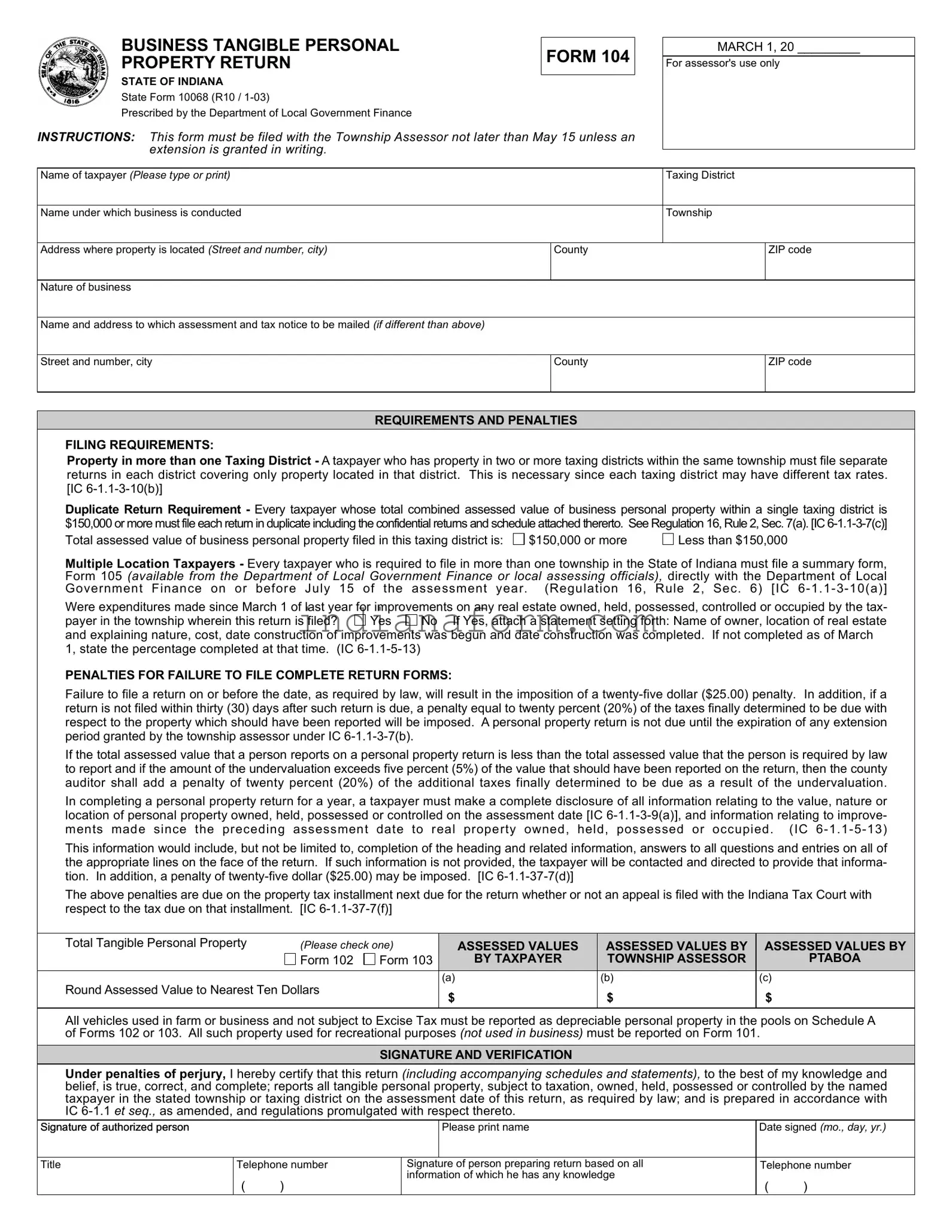Name of taxpayer (Please type or print) |
|
Taxing District |
|
|
|
|
Name under which business is conducted |
|
Township |
|
|
|
|
Address where property is located (Street and number, city) |
County |
|
ZIP code |
|
|
|
|
Nature of business |
|
|
|
|
|
|
|
Name and address to which assessment and tax notice to be mailed (if different than above) |
|
|
|
|
|
|
|
Street and number, city |
County |
|
ZIP code |
|
|
|
|
REQUIREMENTS AND PENALTIES
FILING REQUIREMENTS:
Property in more than one Taxing District - A taxpayer who has property in two or more taxing districts within the same township must file separate returns in each district covering only property located in that district. This is necessary since each taxing district may have different tax rates. [IC 6-1.1-3-10(b)]
Duplicate Return Requirement - Every taxpayer whose total combined assessed value of business personal property within a single taxing district is $150,000 or more must file each return in duplicate including the confidential returns and schedule attached thererto. See Regulation 16, Rule 2, Sec. 7(a). [IC 6-1.1-3-7(c)]
Multiple Location Taxpayers - Every taxpayer who is required to file in more than one township in the State of Indiana must file a summary form, Form 105 (available from the Department of Local Government Finance or local assessing officials), directly with the Department of Local Government Finance on or before July 15 of the assessment year. (Regulation 16, Rule 2, Sec. 6) [IC 6-1.1-3-10(a)]
Were expenditures made since March 1 of last year for improvements on any real estate owned, held, possessed, controlled or occupied by the tax- payer in the township wherein this return is filed?  Yes
Yes  No If Yes, attach a statement setting forth: Name of owner, location of real estate and explaining nature, cost, date construction of improvements was begun and date construction was completed. If not completed as of March 1, state the percentage completed at that time. (IC 6-1.1-5-13)
No If Yes, attach a statement setting forth: Name of owner, location of real estate and explaining nature, cost, date construction of improvements was begun and date construction was completed. If not completed as of March 1, state the percentage completed at that time. (IC 6-1.1-5-13)
PENALTIES FOR FAILURE TO FILE COMPLETE RETURN FORMS:
Failure to file a return on or before the date, as required by law, will result in the imposition of a twenty-five dollar ($25.00) penalty. In addition, if a return is not filed within thirty (30) days after such return is due, a penalty equal to twenty percent (20%) of the taxes finally determined to be due with respect to the property which should have been reported will be imposed. A personal property return is not due until the expiration of any extension period granted by the township assessor under IC 6-1.1-3-7(b).
If the total assessed value that a person reports on a personal property return is less than the total assessed value that the person is required by law to report and if the amount of the undervaluation exceeds five percent (5%) of the value that should have been reported on the return, then the county auditor shall add a penalty of twenty percent (20%) of the additional taxes finally determined to be due as a result of the undervaluation.
In completing a personal property return for a year, a taxpayer must make a complete disclosure of all information relating to the value, nature or location of personal property owned, held, possessed or controlled on the assessment date [IC 6-1.1-3-9(a)], and information relating to improve- ments made since the preceding assessment date to real property owned, held, possessed or occupied. (IC 6-1.1-5-13)
This information would include, but not be limited to, completion of the heading and related information, answers to all questions and entries on all of the appropriate lines on the face of the return. If such information is not provided, the taxpayer will be contacted and directed to provide that informa- tion. In addition, a penalty of twenty-five dollar ($25.00) may be imposed. [IC 6-1.1-37-7(d)]
The above penalties are due on the property tax installment next due for the return whether or not an appeal is filed with the Indiana Tax Court with respect to the tax due on that installment. [IC 6-1.1-37-7(f)]
Total Tangible Personal Property |
(Please check one) |
|
ASSESSED VALUES |
ASSESSED VALUES BY |
ASSESSED VALUES BY |
|
Form 102 |
Form 103 |
|
BY TAXPAYER |
TOWNSHIP ASSESSOR |
PTABOA |
|
|
|
(a) |
|
(b) |
(c) |
Round Assessed Value to Nearest Ten Dollars |
|
$ |
|
$ |
$ |
|
|
|
|
|
|
|
|
|
|
|
All vehicles used in farm or business and not subject to Excise Tax must be reported as depreciable personal property in the pools on Schedule A of Forms 102 or 103. All such property used for recreational purposes (not used in business) must be reported on Form 101.
SIGNATURE AND VERIFICATION
Under penalties of perjury, I hereby certify that this return (including accompanying schedules and statements), to the best of my knowledge and belief, is true, correct, and complete; reports all tangible personal property, subject to taxation, owned, held, possessed or controlled by the named taxpayer in the stated township or taxing district on the assessment date of this return, as required by law; and is prepared in accordance with IC 6-1.1 et seq., as amended, and regulations promulgated with respect thereto.
Signature of authorized person |
|
|
|
Please print name |
Date signed (mo., day, yr.) |
|
|
|
|
|
Title |
Telephone number |
Signature of person preparing return based on all |
Telephone number |
|
( |
) |
information of which he has any knowledge |
|
|
|
|
|
( |
) |



 Yes
Yes  No If Yes, attach a statement setting forth: Name of owner, location of real estate and explaining nature, cost, date construction of improvements was begun and date construction was completed. If not completed as of March 1, state the percentage completed at that time. (IC
No If Yes, attach a statement setting forth: Name of owner, location of real estate and explaining nature, cost, date construction of improvements was begun and date construction was completed. If not completed as of March 1, state the percentage completed at that time. (IC